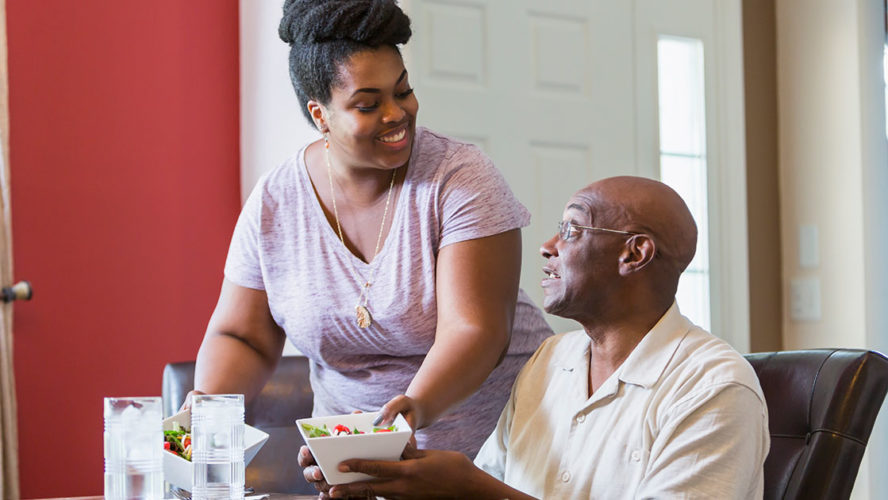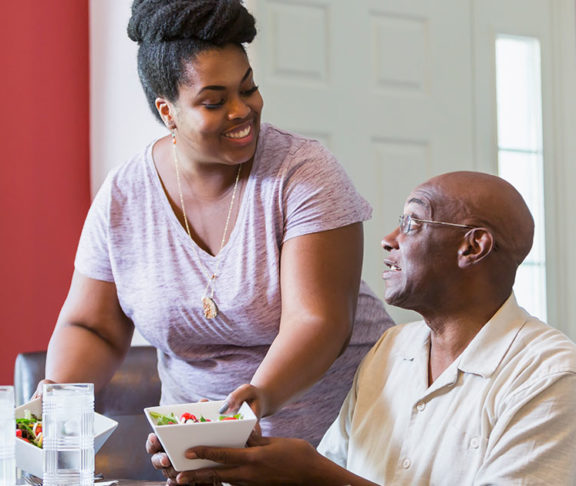When someone you love is diagnosed with Parkinson’s disease (PD), you may feel angry, fearful, confused, and perhaps even panicked.

Rebecca Gilbert, M.D., Ph.D.
Chief Scientific Officer, American Parkinson Disease Association
You will have many questions: What exactly is Parkinson’s disease? What happens next? What can we expect in the future? How can I best help my loved one? It’s a lot to take in, but there is also a lot of information and support available to help you navigate this PD journey.
Expecting the unpredictable with Parkinson’s disease
PD is a progressive illness, meaning that the symptoms may worsen over time. However, this progression rarely happens in a predictable way, and the severity of symptoms can vary greatly from day to day and person to person. Talk to the neurologist about what symptoms to look out for and then keep track of how often these symptoms occur. This information will enable the doctor to make adjustments to the treatment plan that can greatly help the person with PD. The free APDA Symptom Tracker App can help.
As a care partner, your responsibilities may also include building relationships with members of the healthcare team; coordinating medical visits; and optimizing the overall health of the person with PD through medication management, exercise, nutrition, and socialization. Many care partners find it helpful to keep written notes about office visits and changes to treatment. If a symptom, such as tremor or poor balance, occurs intermittently at home and is unlikely to occur during an office visit, consider taking a video at home to show to the neurologist. Using pillboxes or daily calendars can also help keep track of complex medication schedules.
Because PD affects people at different ages and stages of life, preparing for the future can mean different things to different people with PD. Consulting with a financial planner and/or elder care attorney may provide important guidance and can help identify resources and opportunities for planning ahead. Early on in the disease, it is also important to discuss tough topics like alternative living arrangements, living wills, durable powers of attorney, and the use of medical interventions that prolong life.
Take care of yourself, too
While it may feel like you cannot take time for yourself right now, doing so is actually more important than ever. To maintain the strength and stamina to care for your partner, you must take care of your own needs first. Just as exercise, good nutrition, and adequate sleep are important for your partner, they are equally important for you. Be sure to stay on top of your own medical visits and check-ups.
Don’t be afraid to ask for and accept help. You need and deserve a break from your caregiving demands, so seek assistance from other family members, friends, or even agencies. When people offer to help, be specific about what they can do to ease the demands on you. Many people want to support you but are not sure what would be useful, so do not be shy about telling them exactly what you need.
It is important to find a way to express the feelings and intense emotions that can arise as a care partner. Talking to someone who will listen without judging can help relieve the emotional burden. This can be a trusted friend or family member, or you may find comfort in a care partner support group (either in-person or virtal) where you can talk with people who can relate to what you are experienceing and offer helpful advice. You may also find that writing down your feelings in a journal can help.
If you are feeling overwhelmed or need additional emotional support, do not hesitate to seek professional counseling. Social workers, psychologists, and other mental health providers are trained to assist people in many life situations, including those who are caring for a partner with a chronic disease.
PD can be an emotionally isolating illness. If the symptoms make it difficult to navigate public environments, you and your partner may find yourselves cutting back on social activities such as dining out with friends, going to community events, or participating in other outings you used to enjoy. If this is the case, it is important for you to maintain your own personal social life as much as you can. Meeting a friend for a favorite activity will keep you connected to your support network and give you much needed time away from your care partner role. Even a simple phone call or quick chat over a cup of coffee can be beneficial.
For more information and support, contact the American Parkinson’s Disease Association at www.apdaparkinson.org or 800-223-2732.

